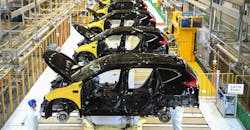Virus Endangers Parts Supply for Already-Embattled Car Industry
This photo taken on November 27, 2019 shows employees working on an assembly line at the third auto plant of Dongfeng Honda in Wuhan in China's central Hubei province.
The global car industry is facing a stress test as the coronavirus outbreak in China disrupts the supply of components from transmissions to steering systems.
Parts manufacturers across China have suspended production through this week and in the case of Hubei province, the outbreak’s epicenter, factories will remain shut until Feb. 13 or later. That leaves car plants at risk both in China -- the world’s largest market -- and beyond: Hyundai Motor Co. on Tuesday became the first global carmaker to halt production outside China because of component shortages caused by the virus.
A lack of parts adds another major headache for an industry already battling waning demand and rising spending requirements for electric and autonomous vehicles. Carmakers are eliminating more than 80,000 jobs during the coming years, according to data compiled by Bloomberg News, as trade tensions and tariffs raise costs and competition from ride-on-demand services increases.
Wuhan, the capital of Hubei, is one of the top auto-industry hubs in China, together with Shanghai, Guangzhou and Chanchun, where global manufacturers make both cars and components together with partners. Hundreds of suppliers have factories in Hubei, including more than half of the Top 20 global parts makers, with Robert Bosch GmbH, Valeo AS and ZF Friedrichshafen AG among those producing components there, according to China Automotive Technology & Research Center.
“Carmakers will face severe parts-supply issues, something companies didn’t encounter during the SARS period,” said Cui Dongshu, secretary general of China’s Passenger Car Association, referring to the 2003 outbreak. “Wuhan is the most cost competitive among China’s car-industry hubs, therefore many parts makers produce components there and supply their clients around the world.”
Most Bosch sites “are preparing to resume production in the next days,” the German company said in an emailed statement. “We constantly evaluate the situation.”
General Motors Co., Volkswagen AG and Toyota Motor Corp. are among companies that have closed China plants at least through Feb. 9, taking heed from several provinces that advised companies not to resume operations any sooner than an extended holiday break. Tesla Inc. is among companies saying they’re monitoring potential supply-chain interruptions for cars built outside China as well.
The outbreak may reduce vehicle output by more than 1.7 million cars because of plant closings, according to IHS Markit. Hyundai halted all of its output in South Korea because of a wiring-part shortage caused by one worker at a supplier in China getting infected by the virus.
About the Author
Bloomberg
Licensed content from Bloomberg, copyright 2016.
